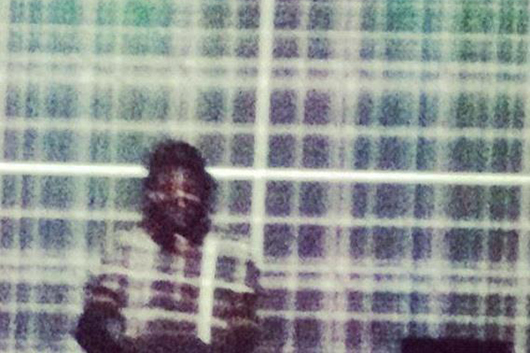Bubblin’ Up: Youandewan
For many artists, genre consistency is something to be strived for with an almost religious […]

Bubblin’ Up: Youandewan
For many artists, genre consistency is something to be strived for with an almost religious […]

For many artists, genre consistency is something to be strived for with an almost religious devotion, but that’s not the case for London-based producer Youandewan (a.k.a. Ewan Smith). His development as an artist has gone through multiple stages, with his aesthetic intermittently changing direction and at times gravitating towards seemingly incongruous poles. Quite simply, the man has followed his fancy, taking jaunts through garage-leaning deep house, blippy minimal techno, and even Burial-inspired bass. And while it would be easy to label him a trend-hopper, digging a little deeper makes it clear that there is a method to the man’s madness. Beneath the surface, there has always been a cohesive current running through Youandewan’s music, a sensibility borne from an underlying interest in acoustic texture and ambient sonics. In recent months, his output has settled into a smooth and refined brand of low-key house, but there’s little question that the formation of Youandewan’s musical identity has been a process.
“Well, I wouldn’t say I really make club bangers,” explains Smith when asked about his thoughts on the Youandewan aesthetic. “But what I do know how to do is how to layer textures and pads together to get a sort of underwater feel. Layered—that’s what I really like.” This interest is something he actually dates back to his high school years, a time when he was primarily messing around with the eJay music production software. Even then, Smith gravitated towards melody over rhythm, composing what he recalls as “space” music for public broadcast on campus. This tendency has carried through to the present, as Smith explains, “I’ll make a really simple beat and then the next thing it’s straight on to pads, and trying to get some mood going before getting any sort of rawness or club feel. The beat’s almost a metronome for the pads.”
Music became a more serious pursuit once Smith moved to York, a city in the North of England near Leeds, to attend university. While there, he was introduced to the then-rising sound of acts like Justice and the rest of the Ed Banger canon, who inspired him to begin studying music technology with an eye towards eventually producing his own tunes. Eventually, he found his tastes changing as he got older. “At 18 we used to go to Fabric and just go absolutely nuts like it was a mosh pit,” recounts Smith. “There was Erol Alkan and people like that and we’d be going crazy and it wasn’t about the music. It was just a big party. But then, as I delved into more underground music, I found there was this whole other thing.” After getting more in tune with the local scene, he made the decision to drop out of school and pursue music full time. “I started meeting people who were doing parties and starting record labels,” he says. “I got involved with them, and so I dropped out of university to just concentrate on making music. I wanted to sit down and spend my days writing music. And then, amongst those people I did meet, [some] were running parties, so I ended up getting some slots DJing and it’s just kind of gone from there.”

Smith also refused to get a real job, instead trying to make a living exclusively as a producer. Relatively quickly, that decision spawned some unintended consequences. Hard up for cash, Smith found himself in the situation of being forced to not only regularly put out music, but also to take on as many remixes as he possibly could. One the one hand, this effort improved his stature as an artist, but it was also necessary simply to pay the bills. “I just kind of sat there and really went for it. But I took on quite a few remixes, which now I wouldn’t do… It was mainly a financial thing with people offering money and me not being in a position to say no to it. So, yeah, I mean, there are quite a few out there, but I kind of don’t acknowledge them and hope they slip underneath everything.” Smith might be coy about some of his remix work, but so far, that side of his output has included some of his most enduring material; particularly good are a handful of dubby reworks that make full use of his knack for nuance. For instance, his take on Dusky’s “Lost in You (feat. Janai)” slices up the original’s soulful vocal track and submerges it in haze of cloudy synth work and jacking percussion. As Smith says, he doesn’t make bangers, but the tune might well be the closest thing to a club anthem he’s ever done. Conversely, his rework of Sei A’s “Frozen Flower” douses the source material’s sparse rhythms with emotionally dense stabs cribbed from the jazzier side of Detroit techno.
Those remixes, both released in 2011, coincided with a major turning point in Youandewan’s career—namely, the release of “Youandme (On My Mind)” b/w “Zeal” on Skream’s Disfigured Dubz label. “It was very 2-step and garagey,” he remembers. “I made it just messing around; I was just trying to get that sound, and I never had any intention of releasing that music cuz I was also making deep house. But I made these tracks, and I’ve never made any other tracks like [them], and it just so happened that [they were] played [for] Skream at a party, and he just said he wanted them.” That record, along with 1988—a melodically rich deep house EP featuring a remix by Jimpster—landed Smith some gigs in London, where he hooked up with a friend who was working for the Secretsundaze and Simple labels. The meeting proved to be important. “He told me, ‘You can’t be doing all these remixes,'” Smith explains.
Clearly, Youandewan has taken that advice to heart. After taking most of 2012 off, he’s approached 2013 aggressively, focusing his attention on deep house while turning out a string of murky cuts for a handful of regarded labels. Over the past few months, he’s offered up the Disarray EP for Hypercolour, Times for Secretsundaze, and a split EP with Alex Coulton for 2nd Drop called Secret Foundations 1. Earlier this month, he released What’s the Deal?, an EP for Will Saul’s Simple imprint that might be his most mature effort to date. Listening to the record, it quickly becomes apparent that the shifting patterns and changing structures reveal a young producer who’s found his voice. That said, even though his artistic vision has coalesced, the future of Youandewan remains uncharted. Smith mentions a desire to eventually release something on Aus, Simple’s more banging sister label, but he’s ultimately quick to downplay the aspiration. “Like I said, I can’t make a club banger, so I really don’t know how that’s going to go.” In truth, his whims never carry him to peak time, but given the high quality of his recent output, perhaps they never need to.

